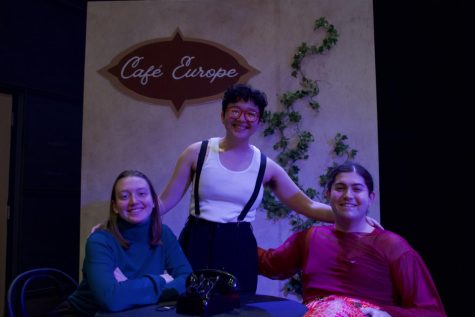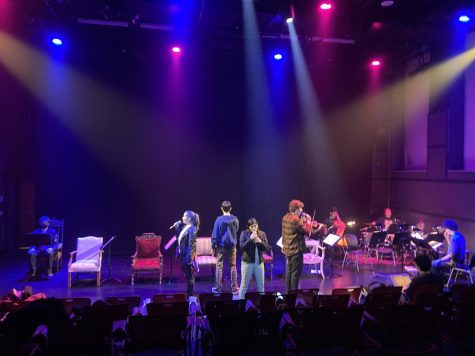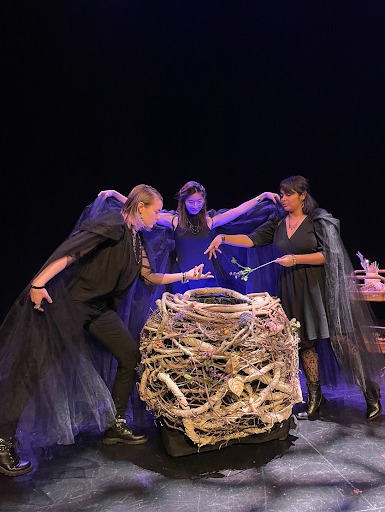E Wolfson, Lour Yasin, and Vanessa Silva ’23 to produce theatre honors performances
March 1, 2023
On March 3, 4, and 5 the Theatre Department will host three senior thesis performances in the directing studio: The Baltimore Waltz directed by E Wolfson ’23, an original musical by Lour Yasin ’23 titled AREA D, and an original play by Vanessa Silva ’23 titled with witchcraft in our lips.

The Baltimore Waltz, E Wolfson
Playwright Paula Vogel’s The Baltimore Waltz tells the story of schoolteacher Anna and her librarian brother Carl as they travel across Europe in search of a cure for a fatal disease that the playwright calls “Acquired Toilet Disease.” The satirical play explores sexuality and queerness during the AIDS epidemic, and it serves as a way for Vogel to honor the memory of her own brother who died of AIDS in 1988. For their Honors Performance, Wolfson will direct and act in the play.
After encountering the history of AIDS in their classes and conducting their own readings of Vogel’s work, Wolfson said they were interested in using their thesis to examine the emotional lens through which The Baltimore Waltz discusses the epidemic. “[During class discussions] I noticed a tension between AIDS forgetting and AIDS nostalgia, where people reflect on the sadness of what happened and also how this awful time period inspired one of the peaks of activism in the United States,” they said.
Wolfson described the negative aspects of the tension they perceived and how they intend to use their thesis to address it. “AIDS nostalgia and AIDS erasure are not good ways to represent or engage with the HIV/AIDS crisis and its academic and artistic lineage. [My] goal is to remember the HIV/AIDS crisis with an activation and tie it to the present day.”
Wolfson hopes to use their thesis performance to illustrate the importance of remembering painful history without sentimentality. “As I was working on the production, I realized how much my Jewish upbringing was influencing things, because my mom was a Holocaust educator and I grew up with this value of remembering,” they said. “When I was researching for the play, I discovered that a lot of early AIDS activism and performance was drawing these really explicit parallels to the Holocaust.”
They noted how AIDS Coalition to Unleash Power (ACT UP), a political organization that advocated for the end of the AIDS epidemic and worked to help AIDS victims, designed its 1987 Pride March float to look like a concentration camp. “I just realized this itch in the back of my mind was my desire and instinct to force people to encounter the truth of this history,” they said.
The play’s subversion of the traditional AIDS narrative— by having the straight female sibling contract the disease and not her gay brother — was intriguing to Wolfson. Wolfson additionally noted how they present Carl as a transgender woman in their production and want to bring attention to how the trans community, specifically trans women of color, have been disproportionately affected by HIV/AIDS.
“[For my senior thesis] I knew that I wanted to do something with HIV/AIDS and with gender and transness,” they said. “[I was] thinking about gender identity of actor, gender identity of character, gender presentation of character — three different facets that can be dissonant or not and kind of change. And this play already has such a body politic to it since the disease is abstracted onto Anna’s body. It’s doing something to de-pathologize the gay male body as the site of illness.”
Wolfson said they are excited for audiences to come see the performance. “I think this play does a really wonderful job of taking you on an emotional journey,” they said. “Then when reality comes crashing in, it makes you think about the reality of the situation. There’s also an opportunity to learn [from the play] and be exposed to this more activist, educational piece. I think the [College] community is ready for that.”

AREA D, Lour Yasin
Yasin wrote, composed, and is now directing and acting in her original musical AREA D, a preliminary version of which premiered during last year’s In the Room workshop series. The musical tells the story of four young Palestinians aspiring to take down what she described as an oppressive and discriminatory system by winning Israel’s Eurovision competition. Yasin described how, through a mix of comedy and her creation of “Rock-Eastern-Broadway fusion” music, she is working to promote the representation of Palestinians in theatre and entertainment.
As a Palestinian student, Yasin said it was important to assemble a production team with people who understood her pro-Palestine perspective. “I always intended for this musical to have racially blind casting, but it’s really important to me that the actors themselves have an understanding of the political situation [that the show references],” she said.
She added that the musical format of the play will provide an accessible way for audiences to digest the political commentary of the production. “I grew up in Jerusalem, so the show is written from my own experience,” she said. “I feel like in today’s media, people still don’t want to listen to Palestinians. When you do speak up, they say it can’t be that bad, but it actually is. I think the musical is trying to explain that, but in a more lighthearted way. That’s one of the ways I can help people who are so detached from it digest the information.”
Yasin hopes to continue developing AREA D after graduating from the College and to one day take it to Broadway. “I am willing to let go of a lot of things in it for the sake of pushing the agenda forward — having more perspectives on what happens in Palestine rather than just pro-Israeli or neutral perspectives,” she said. “I don’t believe [Broadway is] pushing the narrative forward or allowing [Palestinian] people to have representation and visibility.”
While participating in the musical theatre conference at the National Theatre Institute over the summer, Yasin received an encouraging piece of advice about the future of Broadway from Tony-award-winning actor Karen Olivo (KO). “KO told me, ‘You shouldn’t care [what people think]. If this is the story you want to tell, this is the story you’ll tell. I think you should just push it. Broadway’s gonna change at one point. There will be a whole new age of musical theater writers and performers,’” Yasin said.
Yasin said that she hopes members of the College will see AREA D because it blends relatability with hilarity and political commentary. “You have these characters who are very human yet live in a very unnatural, supernatural environment,” she said. “Yet they still get up in the morning and go to school and crack jokes. They try to be teenagers. And they want to take down a system through the arts. I think it’s really inspiring.”
with witchcraft in our lips, Vanessa Silva
Silva’s Honors Performance with witchcraft in our lips takes inspiration from Shakespeare’s depiction of female characters, which Silva studied through coursework at the College and at the Williams-Exeter Programme at Oxford. Silva was especially interested in Shakespeare’s portrayal of women in the context of witch hunts, which was the focus of an essay she wrote during her sophomore year that now forms the basis of her Honors Performance. “[In my essay], I essentially came to the conclusion that Shakespeare talks about a lot of his female protagonists as though they’re partaking in witchcraft if they’re defying patriarchal and heteronormative society,” Silva said. “I’m basically arguing in my research that Shakespeare is hunting witches in his plays and perpetuating this heteronormative patriarchal society through his portrayal of witchcraft.”
with witchcraft in our lips reimagines the tragic stories of female characters in Shakespeare’s plays. The play features original characters inspired by Lady Macbeth, Ophelia, Cleopatra, Viola, Joan of Arc, and more, focusing on their relationships with each other. “This play centers around the strength and love that [my] characters have in a way that I felt was really important, especially because they were inspired by characters who I think [Shakespeare] doesn’t necessarily do that for,” she said. “I wanted to treat these characters with that respect and love.”
Silva placed her Shakespeare-inspired characters in a modern setting to make them relatable to the College audience. “My three main characters in the show are these badass young adults out of college grappling with their place in the world and how to achieve their dreams, while being true to who they are and prioritizing their relationships to each other,” she said. “I came to this conclusion that the [play’s magical elements would be] in relationships with people, both romantic and platonic. At the root of this play is the idea of the actual magic being the way in which we support each other.”
“As a first-generation American and a first-generation college student, Shakespeare has always been something that felt really inaccessible to me,” she said. “[At the College], I’ve encountered a lot of Shakespeare and have questioned the way we talk about Shakespeare — the way we put him on a pedestal. I’m always interested in artists who read with a contemporary lens and reimagine what is part of ‘the canon.’ I’ve always been really interested in reimagining Shakespeare through a feminist, queer lens and how we can tear apart Shakespeare in a way that’s productive.” She added that the play reinvisions Shakespeare’ characterizations by grappling with themes of sexuality and gender.
Silva said she hopes her work’s “magical relationships” will inspire an emotional experience in her audience and help them recognize the magical elements of their own lives. “I hope people will come and just get swept away by the magic of [the play],” she said. “Hopefully, people come out feeling like they have a little bit of that magic to take home with them. So much of the show is acknowledging the magic that lives in all of us and the incredible things that we can all do. I’m hoping that people will see the show and be inspired not by the show, but just by themselves and by the magic that they have.”








